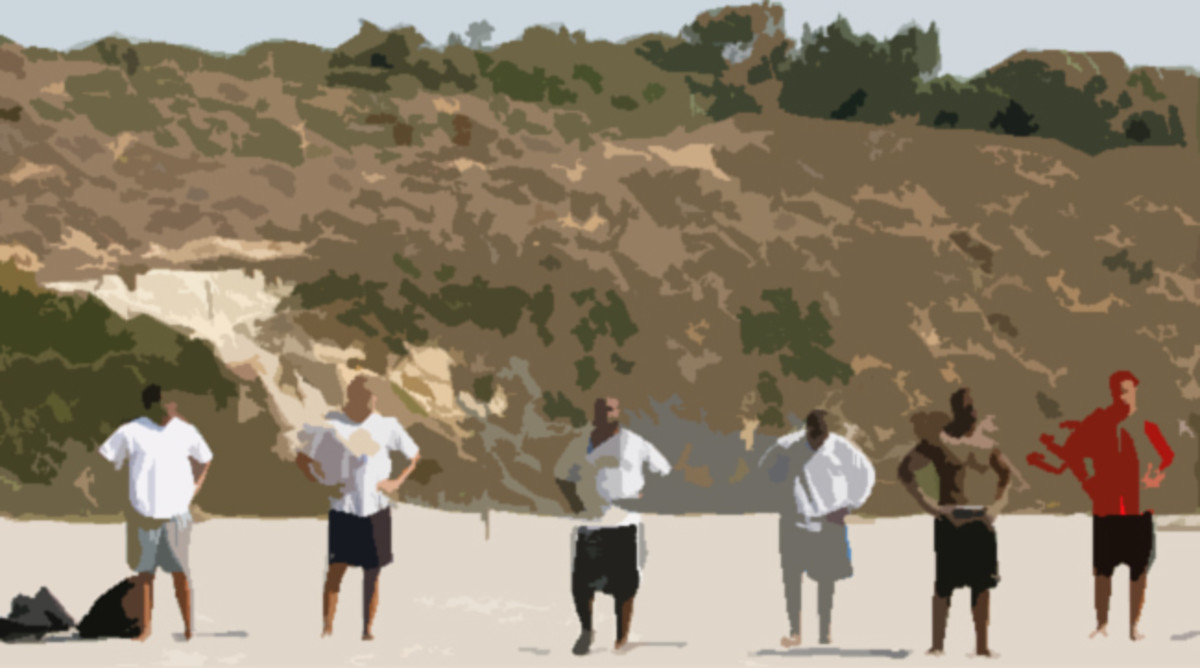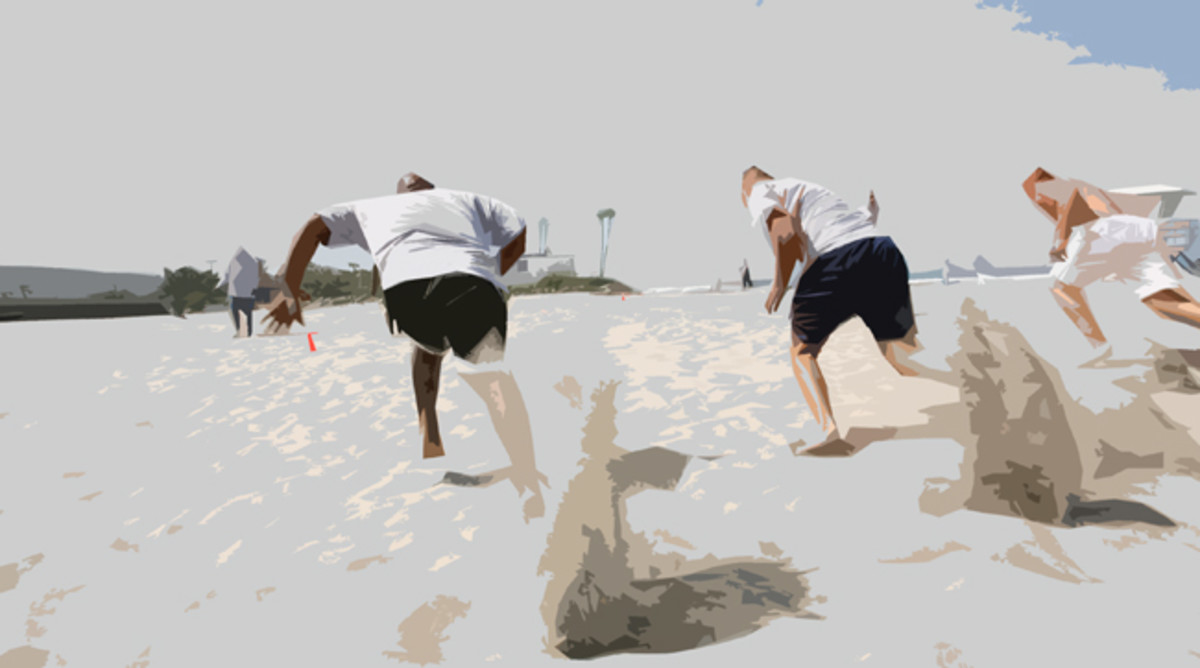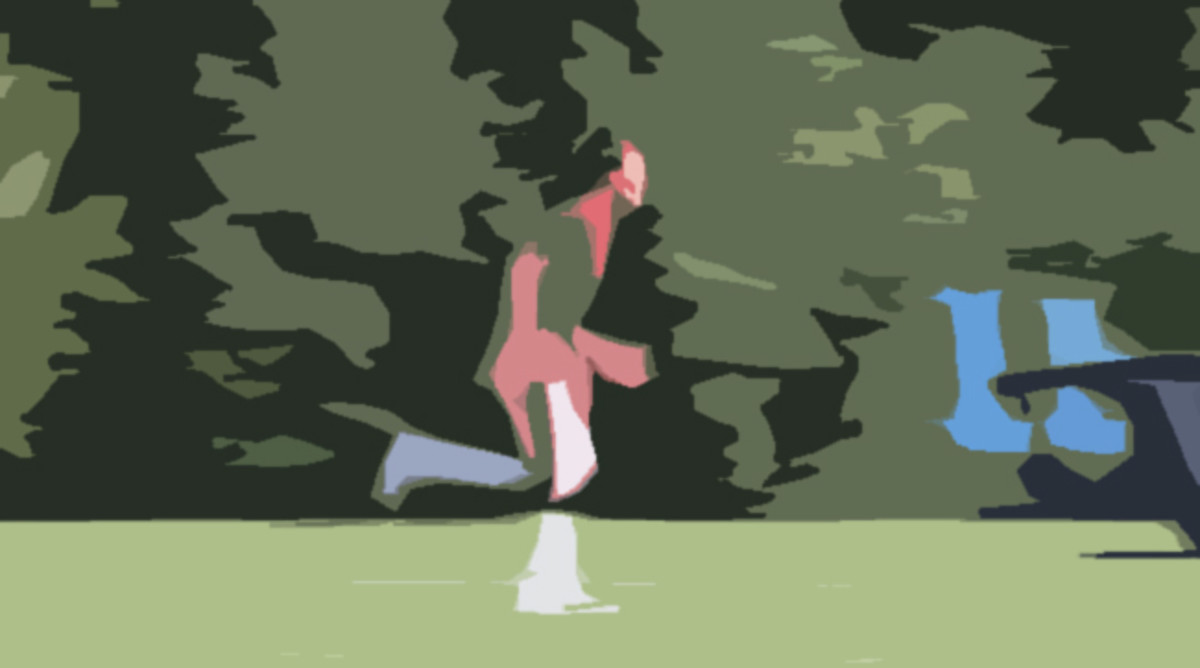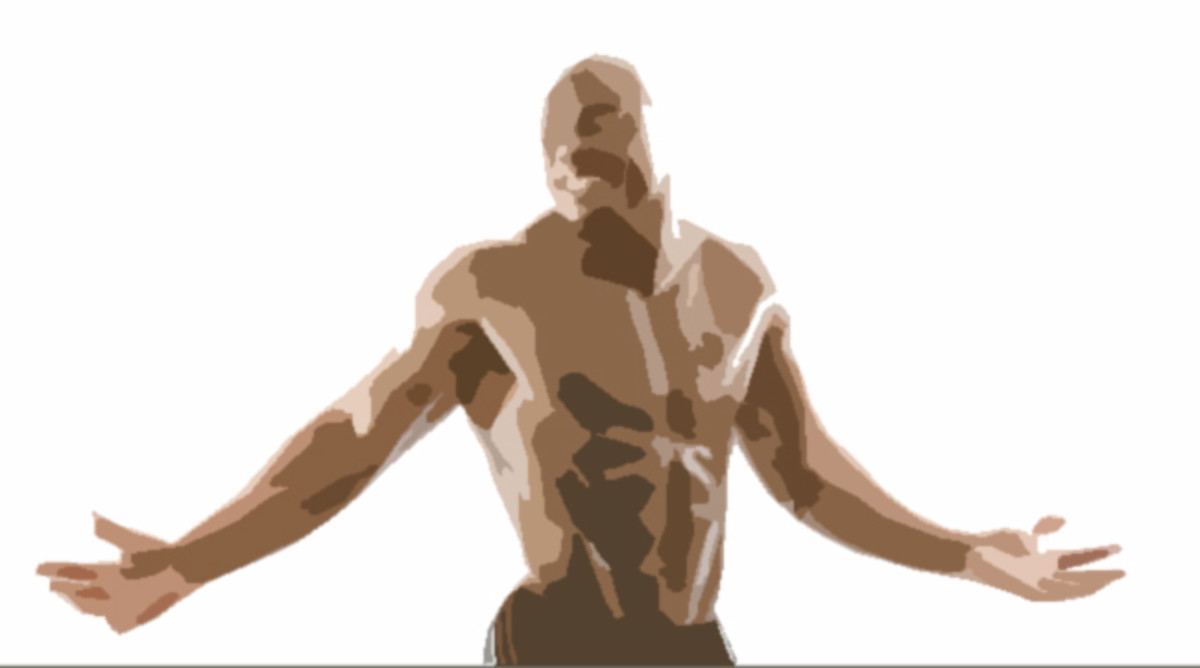Hangman and the Hill

BY BILL SYKEN
@bsyken
Excerpted from the novel Hangman’s Game, © 2015 by Bill Syken. Minotaur Books, a division of St. Martin’s. Printed with permission.
Jai Carson’s home is an Etruscan-style mansion with an electronic gate that opens when I arrive; I pull up into a large semicircular drive and park next to a black Mercedes, a white Bentley, a black Cadillac Escalade, a black Range Rover, a dark-green Prius and, at the end, a true junker—an old boat of a car with one panel of dark maroon, while the rest of the body is baby blue.
Jai, the star linebacker, emerges from the front of his house to greet me. He’s shirtless, wearing only black compression pants, casually displaying his broad chest and shoulders. A peacock trails listlessly by his feet.
“Nick Gallow,” he says with a broad smile. “Welcome, my brother.”
“So you do know my name,” I say. “The other night, I could have sworn you had no idea who I was.”
“No clue,” Jai says, shaking his head and laughing. “But believe me, I know now. I talked to the police about that night in the restaurant like you wouldn’t believe.”
Jai says this as if it’s amusing—as if “that night in the restaurant” hadn’t left one of our teammates dead, as if he isn’t at the center of a murder investigation, and certainly as if I have no right to be offended that he hadn’t recognized me, his punter, even though we have been Philadelphia Sentinels teammates for five years.
After a pause I change the subject. “So … you have a pet peacock.”
“This is Peayoncé,” he says, giving the bird a gentle pat on the head. It bobs back and wanly ruffles its tail feathers.
Hangman’s Game. Click image for purchasing info.

“She looks a little sad,” I say.
“Yeah, she’s a smart gal,” Jai says, looking down at her admiringly. “She knows there’s some stuff going down.”
At least someone in the household is concerned.
“Whose car is that?” I ask, pointing at the older one with the rust spots.
“That’s mine, man,” Jai says. “One of mine, anyway. I call it my crunk-mobile. You recognize it?”
“Should I?”
“You ever see Hustle & Flow?”
“Yeah,” I say. “I liked it.” And now that Jai mentions it, the car is beginning to look familiar.
“This the car from the movie,” Jai says.
“How'd you get it?” It’s an odd piece of film memorabilia—not exactly James Bond’s Aston Martin.
“They were selling it at auction,” Jai says. “Pretty sure it was a benefit.”
“How much did it run you?” Without the movie association, the beater wouldn’t have been worth $300.
“I don’t know,” he says. “I just told my guy, get me that car, and here it is.” Jai waves for me to follow him and we walk inside. He’s beat-boxing to a song along the way.
We walk through the columns of the front porch, past the tall white doors and inside into a wide circular atrium with a high domed ceiling and a marble-tile floor. Inlaid in the floor, in gold script, are the words Swagga Life.
That inscription will do wonders for the home’s resale value, no doubt.
“I hired the same architects who worked on the Bellagio,” Jai says.
“It shows.”

“Here, let’s go this way,” he says, pointing through a doorway. “You got to get the tour of the house. Everyone gets the tour.”
We walk back and to the left, and into a room filled with candy. The shelves hold large glass jars filled with Gummi worms, Tootsie Pops, butterscotches, peppermints, and on and on. He also has racks stocked with M&M’S, Hershey bars, Skittles, Reese’s Pieces and bubblegum, as if he’d walked into a convenience store and bought displays in toto.
I’m stunned. I know the restrictive diet my father set me on as a young player was atypical, but still, it’s shocking to find, in the home of the Sentinels’ most decorated player, this monument to everything I couldn’t have.
“I call this Sugar Mountain,” Jai says, grabbing a pack of Reese’s Pieces. “Want anything?”
“No thanks,” I say, then ask, “You have kids?”
“Two,” Jai says. “Boy and a girl. They’re great, man. They love this room. When they visit, I can’t get those kids out of here.”
We walk on, through a spacious kitchen and into Jai’s trophy room. While I inspect the hardware, Jai rips open a pack of Reese’s Pieces and pours the candy into this mouth like he is drinking a soda.
I look find his Defensive Player of the Year Award, which he won while I was still in college. I can remember watching Jai on television and being in awe—the nasty sacks, the open-field takedowns, the strips on running backs, the leaping interceptions. His opponents looked so overmatched that it hardly seemed fair, these ordinary humans having to suffer an assault from this otherworldly terror.
We pass through into the next room, which has a flat screen covering one wall. There are no chairs—just a pair of gigantic mattresses that look like they could each hold six people across. The back mattress is elevated a couple feet higher than the front one, and a dozen black pillows line the top of each.
“This is where I hold my movie nights,” Jai says, and then he breaks out into a wide smile. “We turn it on in here, you know what I mean?”
“Where do you get mattresses that big?” I ask.
“I have them custom-designed,” Jai says. “Same dude who made the mattress for my bedroom.”
And with this segue we head up the stairs, to a bedroom that occupies the entire top floor. You just emerge from the stairs and you are in it, feet sinking into the plush black carpet. In the center of the room is the bed—circular, low to the floor, and turquoise. It looks like a huge inflatable pool, except that its sides are curved and made of leather. The dressing area is entirely open and in a corner of the room. Racks of suits and dress shirts abut collections of exercise shirts and leisure wear. There is a neon sign on the wall that reads, in scripted red letters, yes.
“You want to see the coup de grâce?” Jai says.
He pulls back the curtains on a door to a terrace that runs nearly the length of the bedroom. The balcony has a kingly white balustrade that is open at the far right end. The opening accommodates a white slide that curls around in a wide loop and drops into the backyard swimming pool. There is no ladder back up.
“You probably know this from the show,” Jai says.
“The show?” I ask.
“Give It Up for JC,” he says. Of course. This is the name of Jai’s reality dating show.
“I’m afraid I missed it,” I say.
Jai has been the jolly tour guide up to this point, but with this remark his smile flatlines. “Time to get our workout on,” he says. “The guys are already out by the Hill.”

I look to the far back of the property, where eight shirtless men are stretched out and talking to one another among a collection of sandbags and weight vests piled on the lawn. They’re all linebackers, lean and powerful, some new to the team. The math dictates that at least three of the guys here to work out on this hot June day will not be on the roster come September.
“Is Too Big showing up?” I ask. Too Big to Fail is the nickname of Orlando Byrd, a defensive tackle and Jai’s closest friend on the team.
“Nah,” Jai says. “If he tried to keep up with what we’re doing today, he’d have a heart attack.”
We gather in the grassy space between Jai’s pool and the tree line at the back of his property, and I introduce myself to the guys, a couple of whom are fresh out of college. At 6-4 I’m taller than all of them. At 225 pounds I’m within their range of weight. Though I’m a punter, I could pass for one of them, physically.
Jai begins the workout by marching us back and forth across the lawn in a sequence of increasingly complex lunges. The sun’s glare is such that I’m sweating two minutes in. After about 10 minutes of lunges we do squats while holding twenty-pound sandbags chest-high. The sandbags are loosely packed, and we have to squeeze in at the elbows to hold them steady. Then we place the bags to the side and drop down while Jai leads us through a series of planks—the last one is a killer, with our arms spread wide and our bodies just a couple inches off the ground. We hold that for a full minute. A couple of the guys are grunting out curses as their muscles moan.
After Jai tells us we can drop he announces, “Liquid time.” Lying on the lawn is a case of orange Gatorade, the bottles still on a cardboard tray with the plastic ripped open. “Drink up, y’all. We’re about to start the real workout.”
The real workout is the Hill, a fifteen-foot climb at the back of Jai’s property, toward the tree line. It is steep and has a dirt path worn up the middle. We are to run up to the top, curl around to the left, and run down a path that is a little less steep, and then circle back and do it again.
My home workouts include running 17 flights of steps in my apartment building, usually at least twice per session. I feel confident I can handle this little dirt path.
We form a line and begin our ascents. We do 20 climbs, in formation. The incline is steep enough to test my balance.
Then we put on 45-pound vests and go another round of 20. I find it difficult, but manageable.
“Okay, time to turn it up,” Jai says when we’re done. “Pick up a 20-pound sandbag and hold it at chest level the whole time. Anyone lets it drop I’m going to bulldog you into my lawn. And I paid a lot of money for this lawn.”
With the sandbag added to the weight vest, each step up is a battle, and I’m feeling every dig in my thighs. My shoulders are howling as well.
“Keep those bags up!” Jai exhorts. “C’mon punter, I see you dragging!”
I keep the sandbag high until I’ve done my required laps, and then I dump it on the ground and greedily retreat to the cardboard tray with the Gatorade.
I’m not going to say anything, but I hope we’re finished. I’m sucking air, my shoulders are fried, and even my legs are feeling worn. The others don’t seem to be doing any better. A couple guys are taking their Gatorade on one knee, while another is leaning back against a tree, eyes wide in disbelief, as if he just escaped some kind of crash.
Jai says, “Okay, y’all, this is sorry. Do it again, same reps—except this time you’re taking two bags, one on top of the other.”
It sounds like all too much. Somewhere in my head I hear a whisper that I don’t have to do everything Jai tells me to do. But no way am I going to be the first to complain.

After the first lap I feel like I might die. My chest is absolutely pounding.
Qadra Ndukwe, a rookie in front of me, drops to his knees after the third lap and retches orange-pink vomit on the grass. “Keep moving, Qadra!” Jai shouts, jogging in place as he stands over him. “This ain’t college no more. You working for a living now!”
Qadra stays on his knees, heaving.
“I quit,” Qadra wheezes.
“Quit?” Jai drops his sandbags and grabs Qadra by both shoulders and wrenches him back, flinging him to the grass. Jai then gets on top of Qadra and pins the rookie’s arms with his knees and grabs his head with both hands. “Quit?” Jai screams, eyes bulging. “Don’t use that goddam word! Don’t ever use that word!” The rest of us have slowed, our heads turned as Jai continues to squeeze, his neck muscles bulging, and Qadra winces in anguish. I fear that Jai will crush Qadra’s skull in his hands.
“Hey . . .” I say.
Jai whirls around toward me, seething. “Keep running!” He lets go of Qadra and yells, “See what happens when I hear the word quit?”
Jai lifts his bags, and we all pick up our pace. Qadra rises, too, and resumes running. The wisp of rest has robbed me of my momentum, and I’m battling with every step. My legs are quivering, my arms are shaking, sweat is in my eyes, and my heart is racing so fast it feels like it barely has time to beat. But after Jai’s display, I’m going to keep running and keep these bags high, no matter what. It’s like my dad used to say to me: It’s just pain.
After we complete 20 runs, guys are dropping on the grass at the base of the hill. My arms are dangling limply at my side. But I remain standing, chin up, signaling that I’m ready for more.
“That’s it, punter,” Jai says, slapping my rear. “Good run, bro.”
Thank God. I go down on one knee, and then to both knees, and I double over with my forearms on my thighs. My pores pump sweat with each heartbeat. I try to breathe deep to slow my heart rate, but my lungs are heaving beyond my control.
Jai is alone in standing upright. He strolls to the crate of Gatorade, picks it up and tosses fresh bottles to each of us. My bottle hits my weight vest and bounces off, landing on the grass nearby. I reach for the bottle and crack the plastic seal. This now feels like a major strength test.
“Damn,” Jai says in between gasps, sweat pouring from his shaved dome. “That is some good work, y’all. If the Sentinels stink it up this year, it ain’t going to be the linebackers’ fault.”
“Or the punter’s,” I cough out.
The heads swivel toward me, as if I have just spoken an impudence.
“I almost forgot,” Jai says after a moment, walking toward me. “We got a first-timer here. You all know how we welcome first-timers.”
The guys rise to their feet and I feel powerful grips on my arms and legs as I’m lifted and carried facedown, with my weary body sinking limply in the middle.
My first thought is that they’re taking me toward the house. That is until they stop and I smell the chlorine.
“Okay, guys,” Jai says. “One . . . two . . . three!”
I’m flung through the air and hit the cool water face-first, gasping in before I go under. I sink down with alarming rapidity, the weight vest carrying me to the bottom of the pool, which I hit hands first.
I get my legs underneath me and push toward the surface, but with the weight vest on I barely elevate from the bottom of the pool. I raise my hands up but don’t come close to cracking the surface. I can hear what sounds like laughter through the funhouse filter of the water.

This is scarier than being attacked—being hazed by people who are too oblivious to realize the danger they’ve put me in.
But I need to settle myself. Panicking won’t help.
I’m a performer. I can stay calm in the middle of a roaring stadium, with the rush coming at me and 1.3 seconds to get my kick off. I have a good minute here before I die.
I right myself and feel the vest’s front. It’s cinched on with two sets of plastic interlocking clasps. I try the bottom clasp first. It doesn’t unlock easily—it requires a firm press on a precise point—but I find that point and the clasp comes apart. I then undo the top clasp. I slide my arms out of the vest. And then I push up to the surface.
I break through the water and inhale desperately. Kicking toward the pool’s edge, I throws my arms over the side, gasping.
Jai is sitting on the diving board, applauding. The others join in. “Goddamn, punter!” he hoots. “You a goddamn man.” He walks over and grabs my forearms and pulls me out of the pool. Jai and I stand face-to-face, just a few inches apart, and he regards me with delight—or, dare I say it, pride?
“How’d you become such a badass?” he asks, grinning.
“Born that way,” I gasp.
“I bet,” he says. He punches me in the gut—not a real punch, a playful one—and then he screams, “Booyah!” and leaps into the pool, arms and legs spread wide, the vision of a free man.
Bill Syken is a former Sports Illustrated writer and editor. He introduced his Nick Gallow character in a four-part novella, “Night at the Boneyard,” published in 2014 on The MMQB.Hangman’s Game is his first novel.
